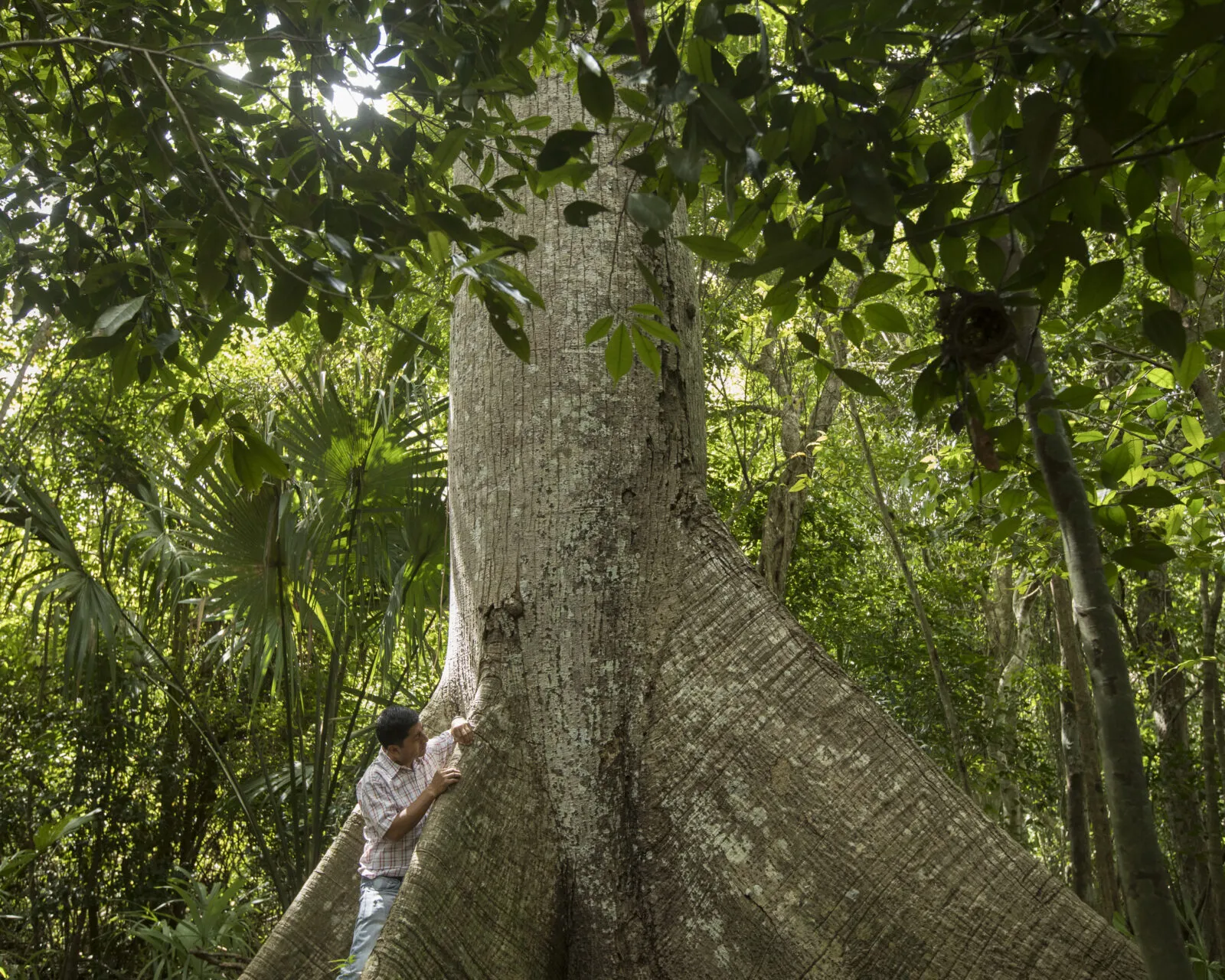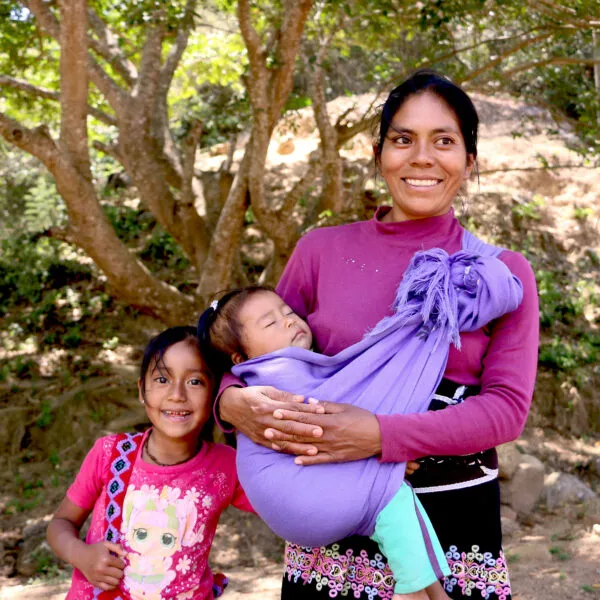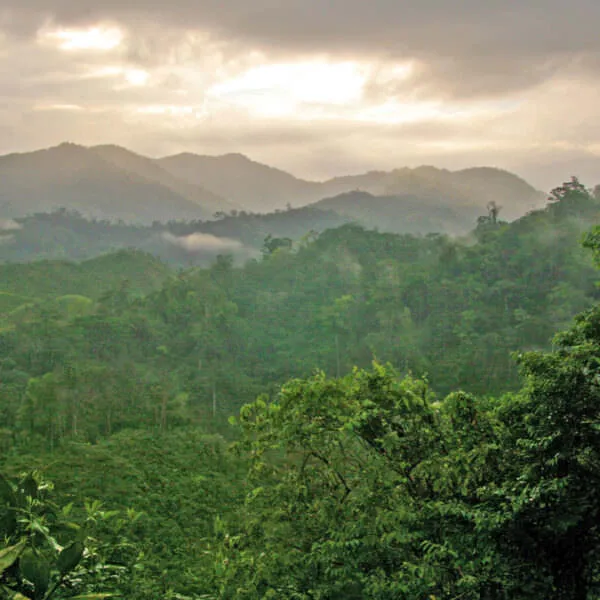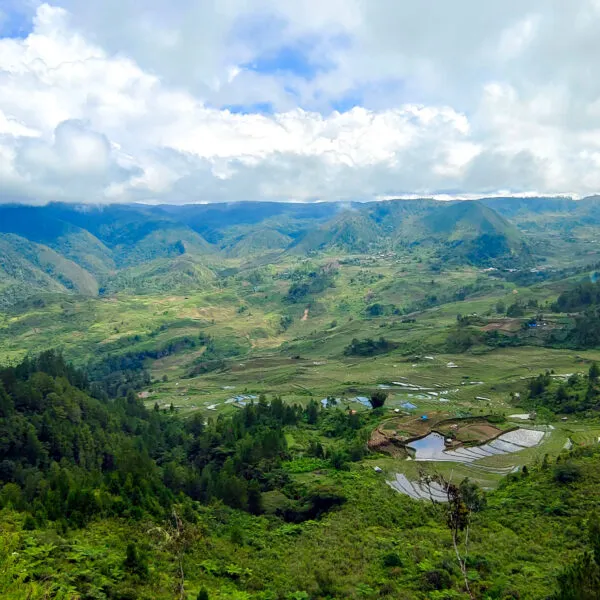Local and Indigenous communities hold rights to nearly 75 percent of Mexico’s forests, yet more than half of the 12 million people who live in and around these forests suffer extreme poverty. Limited access to business development training, financing, and markets prevents communities—and their land—from flourishing. Droughts and extreme weather, along with outmigration of youth, have also taken their toll on rural communities.
The Rainforest Alliance has worked with a diverse range of partners in Mexico for almost three decades to foster the self-determination, economic stability, and sustainability of farming and forest communities. Most of our work focuses on southeastern and central Mexico, where poverty is most extreme—and where deforestation and climate vulnerability have become urgent, deepening crises. Here are some highlights of our work in Mexico.
Healthy forests and vibrant communities are an essential part of the global climate solution. Sign up to learn more about our growing alliance.
Markets for a Sustainable Future
Building on our many years of experience in these landscapes, in 2019 we launched a ground-breaking national platform, Markets for a Sustainable Future, which joins producers, markets, and consumers who share our vision of cultivating a more sustainable economy within Mexico. As the 15th largest economy in the world, Mexico is well-positioned to transform supply chains from the ground up—thereby making lasting change on the ground for forest communities, rural smallholder farmers, and Indigenous and local people.
Markets for a Sustainable Future currently has more than 20 partners, from growers to companies to retailers, all working to make sustainable products available to Mexican consumers, while improving the livelihoods of almost fifteen thousand people and the health of 200,000 hectares of land.
Building on a successful model
Markets for a Sustainable Future builds on our overwhelmingly successful 2018 initiative, the Alliance for Sustainable Landscapes and Markets. Under this initiative, we worked with the Coffee Producers Network of Oaxaca to share climate-smart agriculture practices with 1,000 smallholder farmers across the state, and to connect them with markets for their beans. As a result, farmers have restored 35 hectares of land, established four plant nurseries that produced 20,000 native trees, and initiated a reforestation effort.
As part of this initiative, we also worked with Alianza Selva Maya, a coalition of five ejidos (communally owned lands) devoted to more sustainable forestry in Quintana Roo. Currently we are working with the support of the Tinker Foundation to strengthen the forestry businesses of 15 ejidos, an effort that benefits almost 3,000 people and more than 500 thousand hectares of forestland.
Reforestation and climate resilience in Chiapas
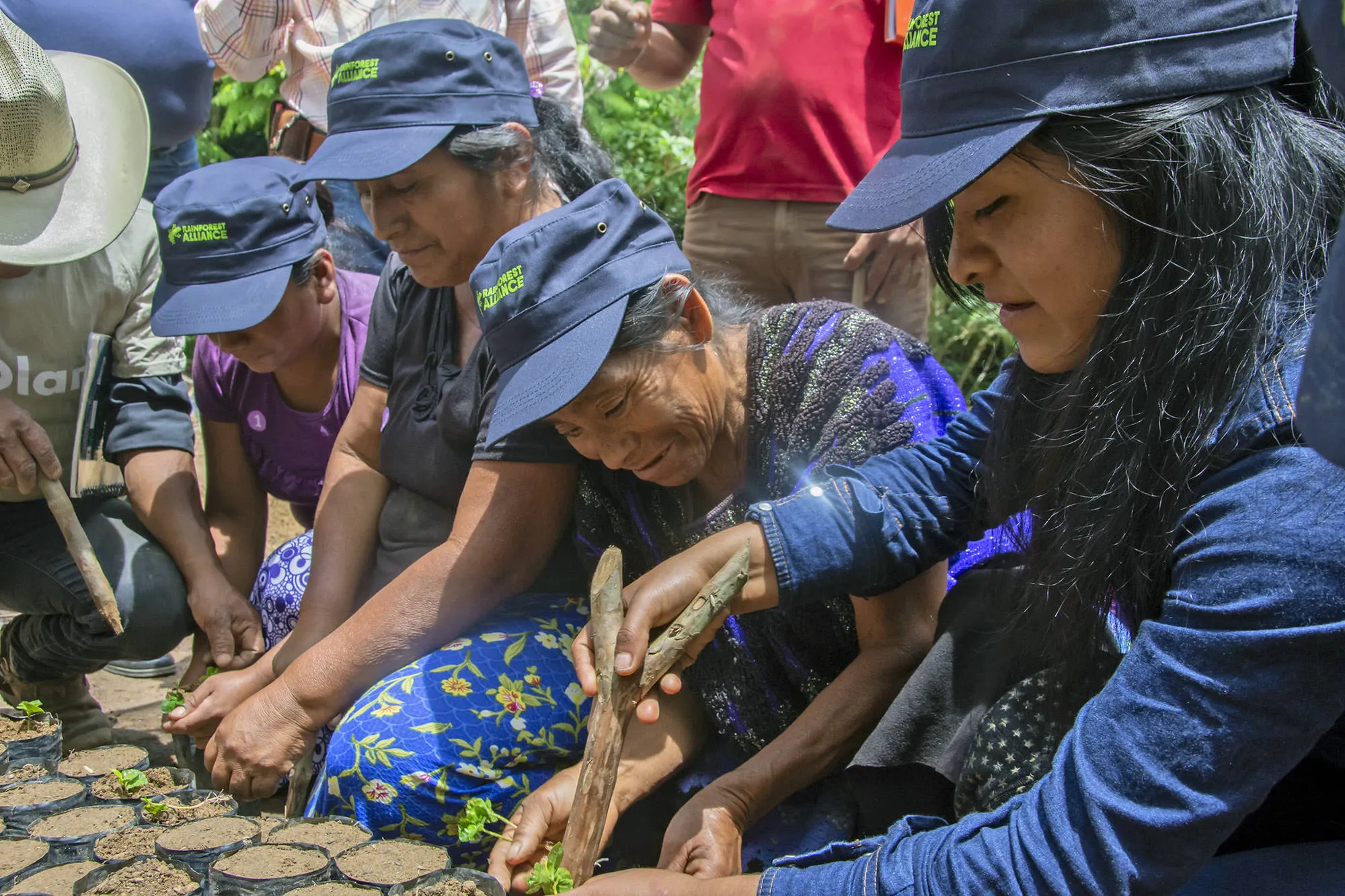
In the Villaflores region of Chiapas, we worked with communities to reforest 4,000 hectares (9,890 acres) of degraded land with native trees. The communities planted more than 540,000 coffee plants, restoring more than 1,000 hectares that had been destroyed by the roya fungus. In addition, 200 smallholder coffee producers have undertaken our climate-smart agriculture training. Two coffee cooperatives here, covering a total of 431 hectares, have achieved Rainforest Alliance certification.
We’re also working with coffee farmers in the Tacaná region of Chiapas to improve climate resilience and agricultural practices. As part of this work, a group of 150 organic coffee farmers achieved Rainforest Alliance certification in 2021. Their coffee plots integrate natural vegetation and healthy ecosystems, making them efficient buffers to the Volcán Tacaná Biosphere Reserve. Farmers restored 52.5 hectares of forest within the reserve itself.
One of these coffee farmers, Brenda Lesvia, said, “Climate change has seriously affected us and our harvests. Our streams are drying up. (But through the certification process) I learned that water and oxygen come from the trees, and now I know how to take care of the trees and to keep reforesting. We will pass this (knowledge) onto our children so that when they grow up they value our natural resources.”
The work done for certification isn’t only to protect the environment, she said: “The Rainforest Alliance also works with us to find a better price for our coffee so that all our efforts (to conserve our environment) are worth it.”
Fruitful alliances
Avocado farming is one of the top drivers of deforestation in western Mexico, which is just one reason that in 2017 the Rainforest Alliance began working with APEAJAL, a 3,200-member association of avocado growers in Jalisco’s Sierra de Tapalpa region. In 2019, we deepened our work with these partners by piloting LandScale, a tool we helped develop to set sustainability goals and measure results, throughout the 190,000-hectare Sierra de Tapalpa landscape. Working with APEAJAL and the local government, we set ambitious sustainability targets—with concrete steps as to how to achieve them—through the year 2030. These actions include developing a pollinator conservation strategy and creating a map of avocado-growing lands to help establish traceability for deforestation-free avocados.
Avocados are just one of the fruit crops we work on in Mexico. We have also provided training in more sustainable farming methods to mango producers in Oaxaca and worked with them to strengthen their business skills so they could sell directly to buyers. As a result, for the first time, these farmers sold their mangos directly to the Mexican juice company JUMEX and to Walmart Mexico. We’re replicating this model with mango and vegetable growers in Mexico City and Oaxaca.
Self-determination for Indigenous people and local communities
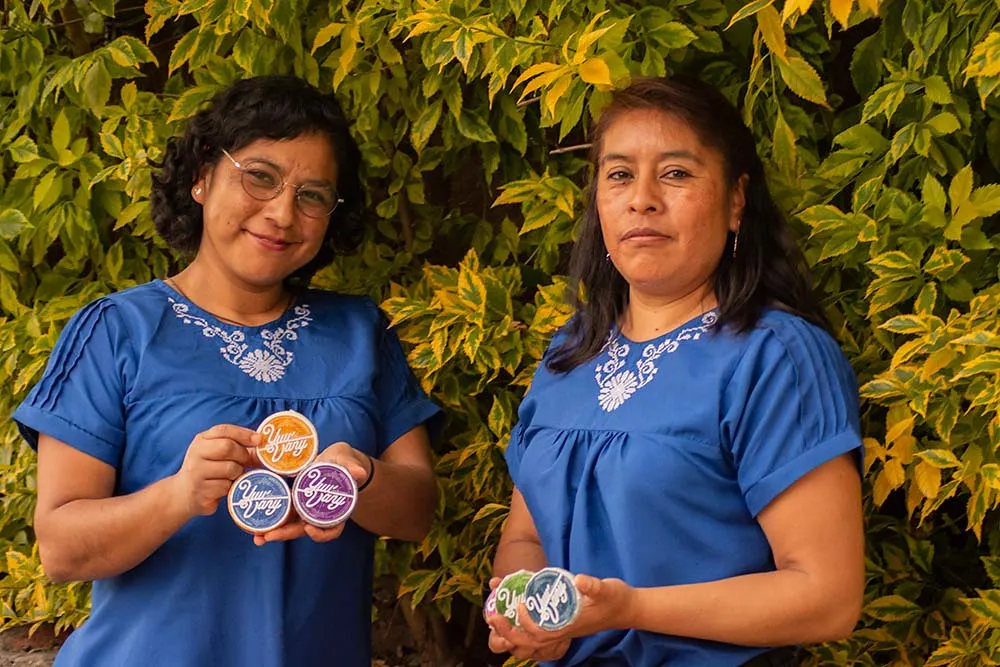
In the states of Yucatán, Quintana Roo, Campeche, Oaxaca, and Jalisco, we oversaw the dispersal of more than $3 million in small grants to two groups: vulnerable populations (women, youth, and those without land tenure) and established community enterprises, such as producer associations and ejidos. It’s all part of the World Bank Strategic Climate Fund’s innovative beneficiaries of the initiative. As the executing agency in Mexico, The Rainforest Alliance has provided extensive support, training, and oversight, but the national steering committee and regional sub-committees—all staffed by Indigenous and local people—made all the granting and financial decisions.
One of the new sustainable businesses that came out of this process, Mujeres Ixtlecas, took an idea rooted in ancestral knowledge of local plants all the way to a bustling health and beauty business. With our support, the group created a formal proposal, outlining specific goals, activities, and a budget. Then, once the proposal was approved, this group of nine Zapotecan women from Oaxaca’s Ixtlan community received training in how to make the soaps, balms, shampoos, and oils. They also participated in a bootcamp for start-ups that gave them business and marketing skills.
Today, their brand Yuu Vany (which means “living earth” in Zapotec) is thriving. Even better, the women now have the skills to write grant proposals and develop businesses—and to do so in a way that is good for people and nature. “This strengthens us as women. Not only does it contribute to our families’ incomes but we can also add value to our community by protecting the environment and believing in ourselves,” Laura Pérez Pérez, one of the women, said. “We have much to learn, but we hope to make our dreams come true.”
Through USAID’s Economic Empowerment of Women in Mesoamerica (WEE), the Rainforest Alliance is also working to support Indigenous Tzotzil, Tzeltal, and Chinantecas women in developing more sustainable businesses.
Creating a new generation of forest guardians
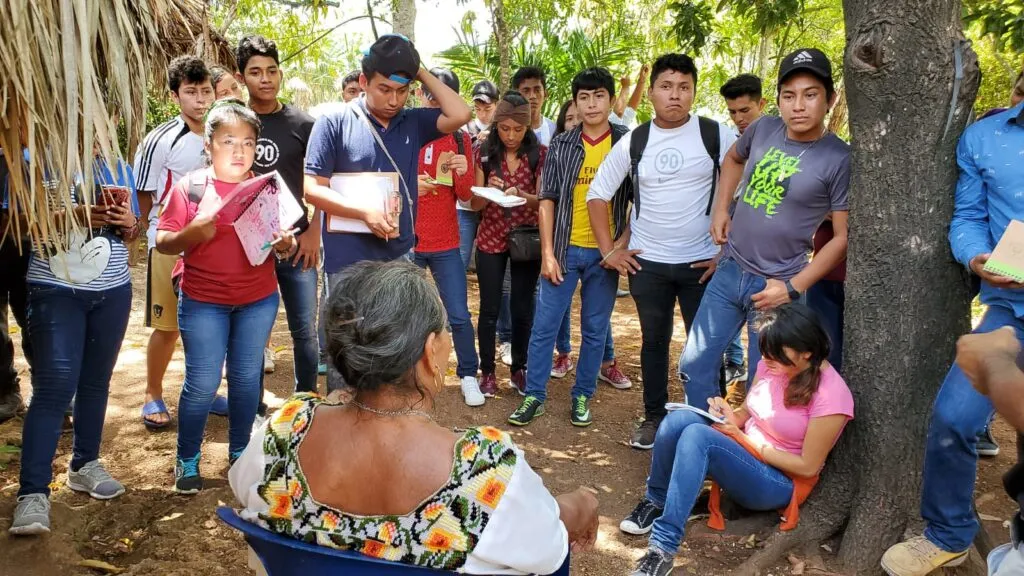
Within the ancient Maya City of Calakmul, in the state of Campeche, sits Mexico’s largest protected tropical forest, the Calakmul Biosphere Reserve. Around the reserve’s buffer zone, 90 ejidos manage their forests sustainably, harvesting timber and other forest products according to strict sustainability plans.
The ejidos are key to conserving this magnificent, biodiverse expanse of forest. But because only residents who own or stand to inherit land have decision-making powers in ejidos, many young people migrate away to urban areas in search of employment opportunities—leaving their communities without the youthful energy and innovation needed to carry on the sustainable management of their forests.
To combat outmigration of the next generation of forest guardians, the Rainforest Alliance began working with young people here in Calakmul in 2016, exposing them to local job opportunities and developing their forestry-related skills and knowledge. More than 120 have participated in this program, Our Forest, Our Future, and six of them have received full scholarships to EARTH University in Costa Rica (supported by the Kellogg Foundation).
One of these scholarship recipients, Carmelina Martínez Hernández, explained how the program changed her view of her community, its natural assets, and her future. “Even though I lived my whole life in a community within the forest, the forest didn’t mean anything to me,” Martínez recalled. “But when I signed up for the Rainforest Alliance program, I learned that the forest is a privilege. (After university), I want to develop projects focused on conservation and sustainable production that create a balance between human beings and nature.”
She added, “The forest gives us everything we need—but only if we use it sustainably.”
